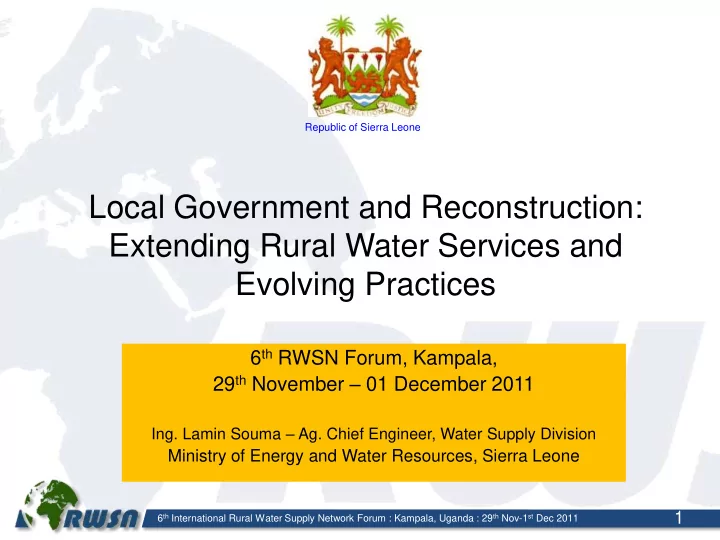

Republic of Sierra Leone Local Government and Reconstruction: Extending Rural Water Services and Evolving Practices 6 th RWSN Forum, Kampala, 29 th November – 01 December 2011 Ing. Lamin Souma – Ag. Chief Engineer, Water Supply Division Ministry of Energy and Water Resources, Sierra Leone 1 6 th International Rural Water Supply Network Forum : Kampala, Uganda : 29 th Nov-1 st Dec 2011
Starting Points • Sierra L eone is classed as a “fragile” state • Fragile states - those where “the government cannot or will not deliver core functions to the majority of its people, including the poor.” (DFID) • Many organisations (UN and NGO’s) working in support of GoSL • Implies capacity and leadership to co-ordinate assistance! 6 th International Rural Water Supply Network Forum : Kampala, Uganda : 29 th Nov-1 st Dec 2011
Sierra Leone timeline 50 th anniversary 1991: civil Emergency 2002: War Recovery of independence war starts declared over Rehabilitation 1999: Parts of December Development Freetown 2006: 90% of seized by rebel country’s debt forces January 2011 written off The distinction between these phases is often NWSP launched blurred and agency activities do not sufficiently evolve! 1990 2000 2012 3 6 th International Rural Water Supply Network Forum : Kampala, Uganda : 29 th Nov-1 st Dec 2011
Challenges for Rural Water Supply in Sierra Leone (1) • Dilapidated infrastructure 100% 80% • Rural WASH coverage rates Coverage 74% remain low 32% 60% 46% • Services in a state of disrepair 40% 20% • Decentralisation has achieved mixed results 0% 1985 1990 1995 2000 2005 2010 2015 2020 • Many players with small Government estimates Government target portfolios poses problems for JMP Estimates co-ordination • Difficulty in paying for services to ensure sustainability 4 6 th International Rural Water Supply Network Forum : Kampala, Uganda : 29 th Nov-1 st Dec 2011
Challenges for Rural Water Supply in Sierra Leone (2) • Community involvement at planning stage is weak • Low public sensitisation & awareness-raising • Weak link between water & sanitation • Neglect of water resources management 5 6 th International Rural Water Supply Network Forum : Kampala, Uganda : 29 th Nov-1 st Dec 2011
DfID Programme of support to SL to address challenges • 3- year programme managed by Adam Smith International to: – Build sector leadership – Support decentralised delivery of services – Create enabling policy, institutional and regulatory environment for improved delivery – Encourage decision-making and management at lower levels – Emphasise cost effectiveness and sustainability – Build capacity at all levels and among all sector actors 6 6 th International Rural Water Supply Network Forum : Kampala, Uganda : 29 th Nov-1 st Dec 2011
The challenge for government (1) • Improving leadership –”set out its vision and thinking” • Defining roles and responsibilities • Ensuring organisations have the skills and capacities to undertake tasks • Encouraging meaningful decentralisation • Providing continued support to local councils UNICEF MoFED African Development Bank GOAL MoAFFS ActionAid ACF Plan Save the EU GTZ Children UK DfID OXFAM World Bank InterAid WaterAid 7 6 th International Rural Water Supply Network Forum : Kampala, Uganda : 29 th Nov-1 st Dec 2011
The challenge for local councils (2) • Recognising WASH delivery as priority • Low financial resources not backed by decentralisation policy • Strengthening capacity (human, technical, financial resources) • Coordinating activities of multiple actors • Providing continued support to CM structures Stakeholders engagement on the new Water Resources Management Bill 8 6 th International Rural Water Supply Network Forum : Kampala, Uganda : 29 th Nov-1 st Dec 2011
The challenge for service providers (3) • Ability to pay for services • Willingness of Government to charge • Collaborating and working with government • Documenting field experiences (and learn from them) • Balancing field level needs with organisational priorities 9 6 th International Rural Water Supply Network Forum : Kampala, Uganda : 29 th Nov-1 st Dec 2011
Supporting Local Councils • Strengthen Councils leadership • In partnership with Councils Ministry undertaking the ff: – Sensitisation of communities on NWSP and its implementation – Local level sector co-ordination and harmonisation – Community-based water resources management – Capacity development – Strategic and investment planning • develop best practice models to replicate and scaled up • provide civil society with a voice 10 6 th International Rural Water Supply Network Forum : Kampala, Uganda : 29 th Nov-1 st Dec 2011
Some ongoing initiatives • Drafting of new National Water Resources Act • Developing national water security plan • Harmonising coordination across WASH sector through institutionalised engagements • Preparing Rural Water Supply and Sanitation Framework and other frameworks and guidelines • Evolving community management models • Undertaking a water point mapping for planning and investment decisions • Establishing £5m WASH facility to foster sector learning and innovation 11 6 th International Rural Water Supply Network Forum : Kampala, Uganda : 29 th Nov-1 st Dec 2011
Summary • At national level SL is – strengthening policy, law and practice around service delivery water supply – Emphasising water resources management, and – Linking water with environmental sanitation and hygiene promotion • Al local government level, Councils to: – Collaborate and work with governments – Strengthen commitment to sustainability – Balance advocacy with the field reality of our “own” achievements 12 6 th International Rural Water Supply Network Forum : Kampala, Uganda : 29 th Nov-1 st Dec 2011
How can RWSN engage with SL? • Cost-effective borehore drilling • Monitoring and promoting self- supply • Monitoring and supporting sustainability • Promoting sector learning 13 6 th International Rural Water Supply Network Forum : Kampala, Uganda : 29 th Nov-1 st Dec 2011
Recommend
More recommend